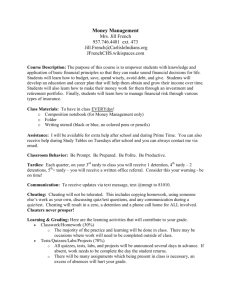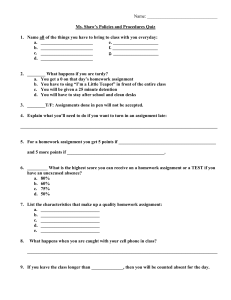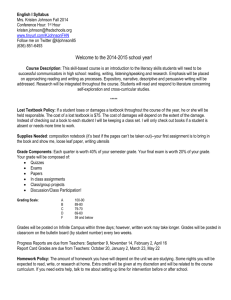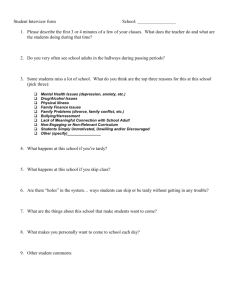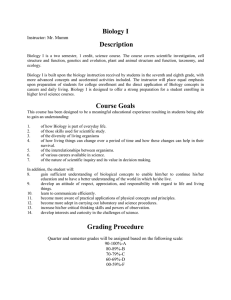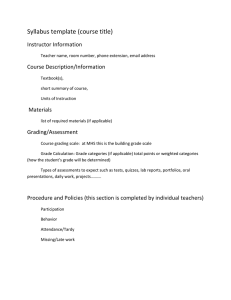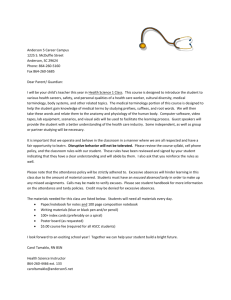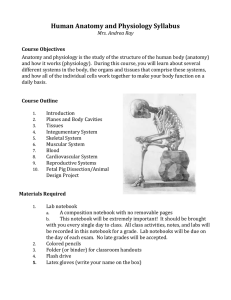Forensics Syllabus
advertisement
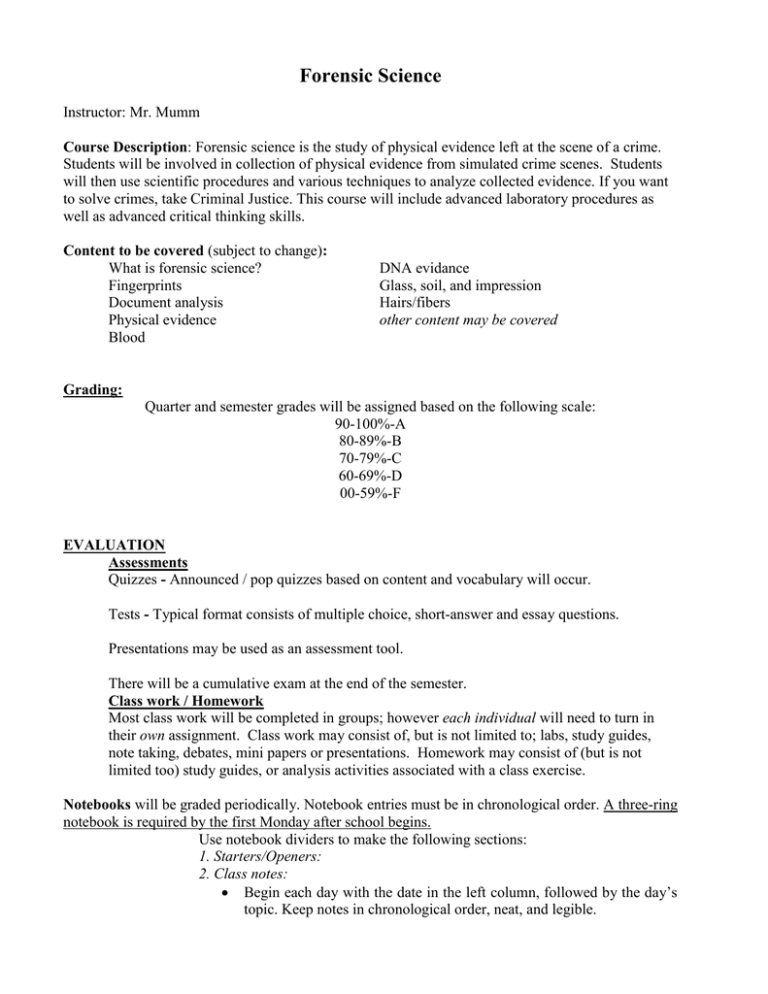
Forensic Science Instructor: Mr. Mumm Course Description: Forensic science is the study of physical evidence left at the scene of a crime. Students will be involved in collection of physical evidence from simulated crime scenes. Students will then use scientific procedures and various techniques to analyze collected evidence. If you want to solve crimes, take Criminal Justice. This course will include advanced laboratory procedures as well as advanced critical thinking skills. Content to be covered (subject to change): What is forensic science? Fingerprints Document analysis Physical evidence Blood DNA evidance Glass, soil, and impression Hairs/fibers other content may be covered Grading: Quarter and semester grades will be assigned based on the following scale: 90-100%-A 80-89%-B 70-79%-C 60-69%-D 00-59%-F EVALUATION Assessments Quizzes - Announced / pop quizzes based on content and vocabulary will occur. Tests - Typical format consists of multiple choice, short-answer and essay questions. Presentations may be used as an assessment tool. There will be a cumulative exam at the end of the semester. Class work / Homework Most class work will be completed in groups; however each individual will need to turn in their own assignment. Class work may consist of, but is not limited to; labs, study guides, note taking, debates, mini papers or presentations. Homework may consist of (but is not limited too) study guides, or analysis activities associated with a class exercise. Notebooks will be graded periodically. Notebook entries must be in chronological order. A three-ring notebook is required by the first Monday after school begins. Use notebook dividers to make the following sections: 1. Starters/Openers: 2. Class notes: Begin each day with the date in the left column, followed by the day’s topic. Keep notes in chronological order, neat, and legible. 3. Classwork/Homework: All HW from chapter in chronological order. 4. Quizzes/Reviews: All Quizzes in chronological order and reviews in order of chapter (CH. 1 review followed by CH. 2 review ….). Late work / Absence / Behavior Late work will not be accepted. It is the students’ responsibility to get any work missed. Tardy Policy: Behavior: 1st & 2nd tardy: Verbal warning and angry scowl 3rd & 4th tardy: 30 minutes detention or 20 minute classroom cleanup 5th tardy: Administrative Referral Please Beware! According to VHS policy, parents cannot excuse a tardy. If getting to school on time is problematic in your home, start planning now on how to overcome your situation, for regardless of who is at fault, if you are late to class it will be a recorded tardy. (FYI: The only accepted excuse for a tardy is a note from a teacher or doctor.) Courtesy towards all. This includes listening when others are speaking, whether it is your classmates or the teacher Preparation: Clothing: Hall Pass: You are expected to come to class with your textbook, notebook, assignments, and writing instruments. You will not be permitted to leave class to retrieve these items. All safety precautions will be taken when in the laboratory setting. Shoes must be worn at all times, and goggles must be worn when chemicals are present in the lab. During lab days, aprons and lab coats are available to protect clothing. You should not wear loose floppy clothing, shorts, or contact lenses during labs. Long hair must be tied back. This is a privilege, and must be earned. Any misuse or excessive use will cause indefinite termination. Food/Drink: No food and drink in the lab (this includes gum and candy). Extra Help: If you need extra help with anything involving science, please feel free to see me anytime I am not in class. I will arrange a time before school, after school, or at lunch time to work with you. Disciplinary Plan The following guidelines will be followed in the event of a discipline problem. 1st Incident: Conference with student and possible detention. 2nd Incident: Referral to Principle and detention and a call to parents/guardians 3rd Incident: Referral to Principle, possible suspension from school, possible removal from the class, and a conference with parents/guardians The word “forensic” comes from the Latin word meaning “before the forum”. Forensic Science Honors examines the application of science to the criminal justice system. Utilizing lecture and laboratory, students collect, preserve, and analyze crime scene evidence in a hands-on experience, learning scientific methods, procedures, and techniques. Labs may include trace analysis of hair, fiber, stain, epithelial cells, fingerprints, and DNA. This class is an excellent prelude to future science and laboratory coursework
